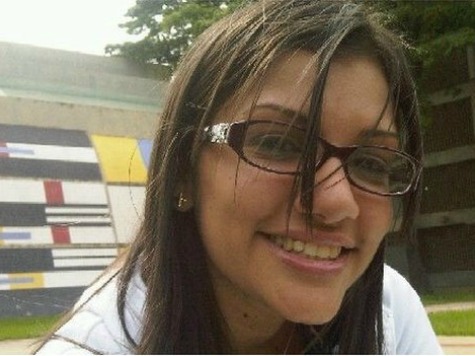Government-sponsored violence against dissidents in Venezuela continues with no end in sight. As the kidnapping of a young journalist at a former opposition network makes headlines, President Nicolás Maduro calls for “dialogue” with members of the opposition who have increasingly gained public mistrust.
Globovision assignment editor Nairobi Pinto was captured by masked gunmen in her home in Caracas as her father, Luis Pinto, pleaded for them to “see sense,” according to the BBC. Her father told Infobae that it was a “particularly rushed and violent incident,” and he was unable to do anything to stop them.
While kidnappings for ransoms occur with some frequency in Venezuela, Pinto’s kidnapping has already distinguished itself: More than 24 hours since the incident occurred, neither her family nor authorities have heard from the kidnappers. Most kidnappers reach out to families for ransom within hours of kidnapping the victim, and they are usually released as soon as money is delivered.
The Venezuelan government wasted no time in blaming the pro-democracy opposition for kidnapping Pinto. Minister of the Interior Miguel Rodríguez Torres told state radio that, given that Pinto lived in a neighborhood near some opposition-built barriers, the violent behavior of the political opposition could have spilled over to kidnapping a reporter. The incident, he said, “calls to attention” the fact that the opposition is visible in that neighborhood. He added that the police had “leads,” but he refused to elaborate to avoid “alert[ing] the kidnappers.”
Other journalists have also suffered violence in Venezuela, often at the hands of the government. According to a new report by the Society of Interamerican Press, 105 journalists in the country have been arrested, beaten, or otherwise injured since the current wave of protests began on February 12th.
Meanwhile, President Nicolás Maduro is investing national media resources into a campaign for “dialogue” between his chosen opposition “leaders” and members of the Union of South American States (Unasur), which is largely Chavista. Unasur also suggested the proposed “human rights council” to be run by Chavista leaders, which Maduro announced last week that he would create.
Set to lead the opposition in those talks is Henrique Capriles Radonski, the governor of the state of Miranda. He ran against both Chávez and Maduro for the Venezuelan presidency and lost to the latter in an election proven fraudulent by international observers. He has become something of a pariah among the Venezuelan opposition for his apparent willingness to work with Maduro’s government. His claims that he will not honor dead protesters or those tortured and incarcerated with a call for Maduro to step down have led to rifts between leaders like Leopoldo López. López is currently serving indefinite jail time for organizing protests.
Assemblywoman María Corina Machado was stripped of legislative immunity for visiting the Organization of American States in Washington, D.C., to call for international aid in stopping Maduro’s violent repression. Machado, who was also attacked with tear gas for attempting to visit her office in the National Assembly, tweeted what appeared to be a jab at Capriles Monday: “The regime says it wants dialogue while increasing the number of prisoners; who do they want dialogue with?”
Added to the proposal for more talks is the proposition of a neutral mediator to work with the government and the opposition. The Vatican has been proposed as the most likely mediator, though that idea has faltered since the Catholic Church in Venezuela issued a stern statement of disapproval to the Maduro regime, calling for an end to violence and repression.

COMMENTS
Please let us know if you're having issues with commenting.